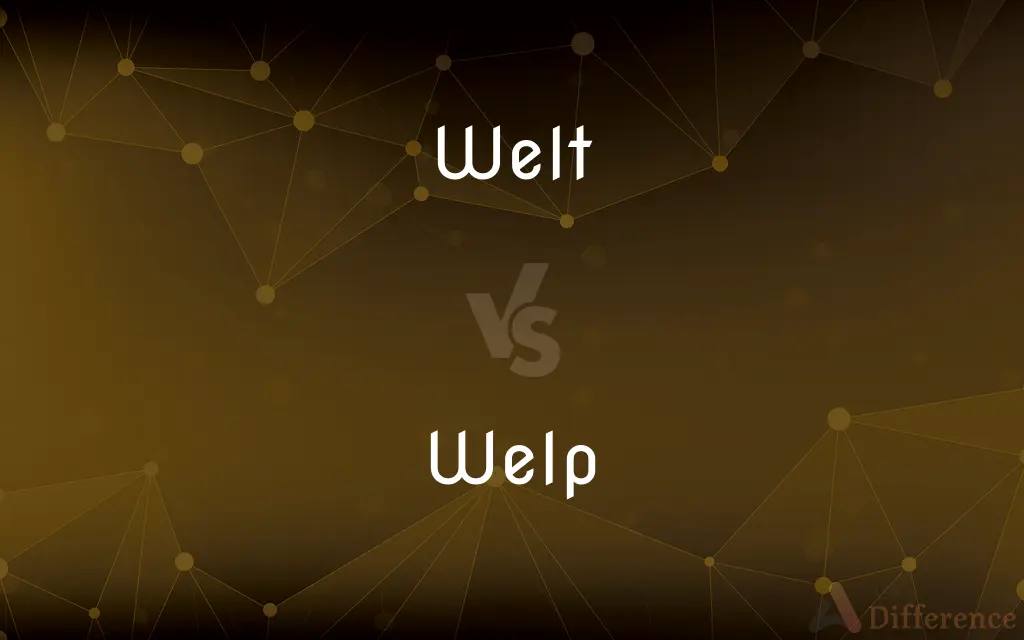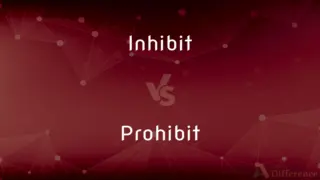Welt vs. Welp — What's the Difference?
By Tayyaba Rehman & Fiza Rafique — Updated on September 19, 2023
"Welt" refers to a ridge or raised mark on the skin or fabric. "Welp" is an informal expression used to signify resignation or acknowledgment. The two words differ in meaning, usage, and context.

Difference Between Welt and Welp
Table of Contents
ADVERTISEMENT
Key Differences
"Welt" is a term commonly used to describe a raised area on the skin, often caused by injury such as a lash or blow. It can also refer to a raised seam or edge in fabrics or leather. "Welp," on the other hand, is a colloquial term, more of an interjection, used to signify resignation, surprise, or the end of a statement. While welt has medical and material connotations, welp is more of a casual slang term used in conversation.
In terms of etymology, "welt" has its roots in Old English and is related to words that imply weaving or winding, which is coherent with its usage to describe raised marks or seams. "Welp" is derived from a distortion of "well," often used in the context of "well, that happened," but shortened for casual and often online dialogue. So, the origins of welt are more formal, while welp has a contemporary, informal genesis.
Grammatically, "welt" is predominantly used as a noun, although it can sometimes function as a verb, as in "to welt." In contrast, "welp" functions primarily as an interjection and doesn't have different grammatical forms. When one talks about a welt, the context usually involves injury or craftsmanship; when one uses welp, the setting is generally casual and conversational.
Finally, the audience and setting for these two words are usually distinct. "Welt" is a word you might hear in a medical clinic, a sewing room, or a shoemaker's shop. "Welp" is a term more likely to be found in text messages, casual conversations, or social media posts. While welt engages more with physicality, welp is about expressing a momentary emotional or cognitive state.
Comparison Chart
Meaning
Raised mark on skin or fabric
Informal expression of resignation
ADVERTISEMENT
Usage
Medical, craftsmanship
Casual conversations, social media
Etymology
Old English, related to weaving
Derived from "well," informal
Part of Speech
Mainly noun, sometimes a verb
Interjection
Context
Formal settings like medical clinics, tailoring
Informal settings like text messages
Compare with Definitions
Welt
A welt is a raised mark on the skin due to injury.
The whip left a welt on his back.
Welp
Welp can signify the end of a discussion. Example
Welp, I guess that settles it.
Welt
Welt refers to a raised edge or ridge in sewing or shoemaking.
The welt on the leather shoe was expertly stitched.
Welp
Welp is an informal way to express resignation. Example
Welp, that didn't go as planned.
Welt
A welt can be an emotional or psychological mark.
The harsh words left a welt on her soul.
Welp
Welp expresses mild disappointment. Example
Welp, maybe next time.
Welt
To welt means to beat so as to produce a welt.
He welted the rug to remove the dust.
Welp
Welp is an informal acknowledgment of a situation. Example
Welp, here we are.
Welt
Welt can also refer to a strip of leather in shoemaking.
The welt was carefully inserted between the shoe's upper and sole.
Welp
Welp is used to acknowledge an unexpected event. Example
Welp, I didn't see that coming.
Welt
A leather rim sewn round the edge of a shoe upper to which the sole is attached.
Welp
Non-standard spelling of well, representing a pronunciation (typically used to convey resignation or disappointment)
Welp, last night was certainly an experience
Welp, spring break is pretty much over
Welt
A red, raised mark or scar; a weal.
Welp
Used to indicate that a statement that follows is contrary to an expected positive circumstance or in accordance with an expected negative or disappointing circumstance
Welp, the subway is closed for repairs—we'll have to take the bus.
Welt
A heavy blow
Let me give it a welt with my hammer
Welp
(slang) Well, typically used to express exasperation, a matter-of-fact or unenthusiastic attitude, or helpless acceptance of something surprising.
Welt
Provide with a welt.
Welt
Strike (someone or something) hard and heavily
I could have welted him
Welt
Develop a raised scar or weal
His lip was beginning to thicken and welt from the blow
Welt
A strip, as of leather or other material, stitched into a shoe between the sole and the upper.
Welt
A tape or covered cord sewn into a seam as reinforcement or trimming.
Welt
A ridge or bump on the skin caused by a lash or blow or sometimes by an allergic reaction.
Welt
A lash or blow producing such a mark.
Welt
To reinforce or trim with a welt.
Welt
To beat severely; flog.
Welt
To raise welts or a welt on.
Welt
To roll; revolve
Welt
To cause to have welts; to beat.
Welt
To install welt (a welt or welts) to reinforce.
Welt
A ridge or lump on the skin, as caused by a blow.
Welt
(shoemaking) A strip of leather set into the seam between the outsole of a shoe and the upper, through which these parts are joined by stitching or stapling.
Welt
A strip of material or covered cord applied to a seam or garment edge to strengthen or cover it.
Welt
In steam boilers and sheet-iron work, a strip riveted upon the edges of plates that form a butt joint.
Welt
In carpentry, a strip of wood fastened over a flush seam or joint, or an angle, to strengthen it.
Welt
In machine-made stockings, a strip, or flap, of which the heel is formed.
Welt
(heraldry) A narrow border, as of an ordinary, but not extending around the ends.
Welt
A feature resembling a welt.
Welt
That which, being sewed or otherwise fastened to an edge or border, serves to guard, strengthen, or adorn it
Welt
A narrow border, as of an ordinary, but not extending around the ends.
Welt
A raised ridge on the surface of the skin, produced by a blow, as from a stick or whip; a wale; a weal; as, to raise welts on the back with a whip.
Welt
A blow that produces a welt{3}.
Welt
To furnish with a welt; to sew or fasten a welt on; as, to welt a boot or a shoe; to welt a sleeve.
Welt
To wilt.
Welt
A raised mark on the skin (as produced by the blow of a whip); characteristic of many allergic reactions
Welt
A raised or strengthened seam
Welt
Beat severely with a whip or rod;
The teacher often flogged the students
The children were severely trounced
Welt
Put a welt on;
Welt the shoes
Common Curiosities
Is Welp an actual word?
Welp is a colloquial term and may not be considered formal English.
Can Welt be used medically?
Yes, welt is often used to describe skin reactions or injuries.
What does Welp signify?
Welp is an informal expression used to signify resignation, acknowledgment, or surprise.
Is Welp American slang?
Welp is widely used in American English but can also be found in other English dialects.
Is Welt a noun or a verb?
Welt is primarily a noun but can also function as a verb.
Do Welt and Welp have similar origins?
No, welt has its roots in Old English, while welp is a modern, informal derivative of "well."
Can Welt also refer to emotional scars?
In a metaphorical sense, yes, welt can refer to emotional or psychological marks.
Is Welp used in professional settings?
Welp is generally not used in professional or formal contexts.
Is it correct to say "a welt on the fabric"?
Yes, a welt can refer to a raised seam or edge in materials like fabric or leather.
What does Welt mean?
Welt refers to a raised mark on the skin or a raised seam in fabrics or leather.
Is Welt a medical term?
It can be used in a medical context to describe a type of skin lesion or reaction.
What is the plural of Welt?
The plural form is "welts."
Is Welp grammatically correct?
While informal, it is accepted in casual conversations and writings.
Is Welp suitable for academic writing?
Welp is generally not suitable for academic or formal writing.
Is Welp used in literature?
Welp might appear in contemporary literature to portray casual or informal dialogue.
Share Your Discovery

Previous Comparison
Inhibit vs. Prohibit
Next Comparison
Vary vs. VeryAuthor Spotlight
Written by
Tayyaba RehmanTayyaba Rehman is a distinguished writer, currently serving as a primary contributor to askdifference.com. As a researcher in semantics and etymology, Tayyaba's passion for the complexity of languages and their distinctions has found a perfect home on the platform. Tayyaba delves into the intricacies of language, distinguishing between commonly confused words and phrases, thereby providing clarity for readers worldwide.
Co-written by
Fiza RafiqueFiza Rafique is a skilled content writer at AskDifference.com, where she meticulously refines and enhances written pieces. Drawing from her vast editorial expertise, Fiza ensures clarity, accuracy, and precision in every article. Passionate about language, she continually seeks to elevate the quality of content for readers worldwide.















































